During Great Lent, the representative of the Patriarchate of Constantinople to the World Council of Churches, Archbishop Job of Telmessos, spoke in favor of changing the rules for calculating the date of Easter so that Orthodox Christians would celebrate this holiday simultaneously with Western Christians.
Commenting on this statement in the Church and World program, the chairman of the Moscow Patriarchate’s Department for External Church Relations, Metropolitan Hilarion of Volokolamsk, noted that such proposals had been discussed for several decades in different contexts, including within the framework of the World Council of Churches. “But the question here is very simple: who should change their Paschal calendar? For example, we are not going to change it,” the archpastor stressed.
Looking back at the background of the issue, Metropolitan Hilarion recalled that, according to the testimony of ancient historians, initially there was no single date for the celebration of Easter in the Christian Church. At the I Ecumenical Council, which took place in Nicaea in 325, it was established that Pascha will be celebrated by all Christians on the first Sunday after the first spring full moon. “The calculation system adopted then is still preserved in the Orthodox Church,” the hierarch stated.
The metropolitan stressed: “There are no internal impulses that would come from our church people in favor of changing the church calendar. This applies not only to the date of the celebration of Pascha, but also to the so-called transition to the new style. From time to time, some people say that we should bring our church calendar in line with the secular calendar. Such attempt was even made in the Russian Church in the 1920s, when Patriarch Tikhon issued an order to switch our calendar to the new style, and two weeks later this order had to be canceled, since the church people did not accept it.”
Thus, Metropolitan Hilarion concluded, “the issue of changing the ecclesiastical calendar is not on the agenda of the Orthodox Church – at least, it is not on the agenda of the Russian Orthodox Church.”
You can follow Pravmir.com on Twitter, Facebook, Instagram, Telegram, or Parler

















